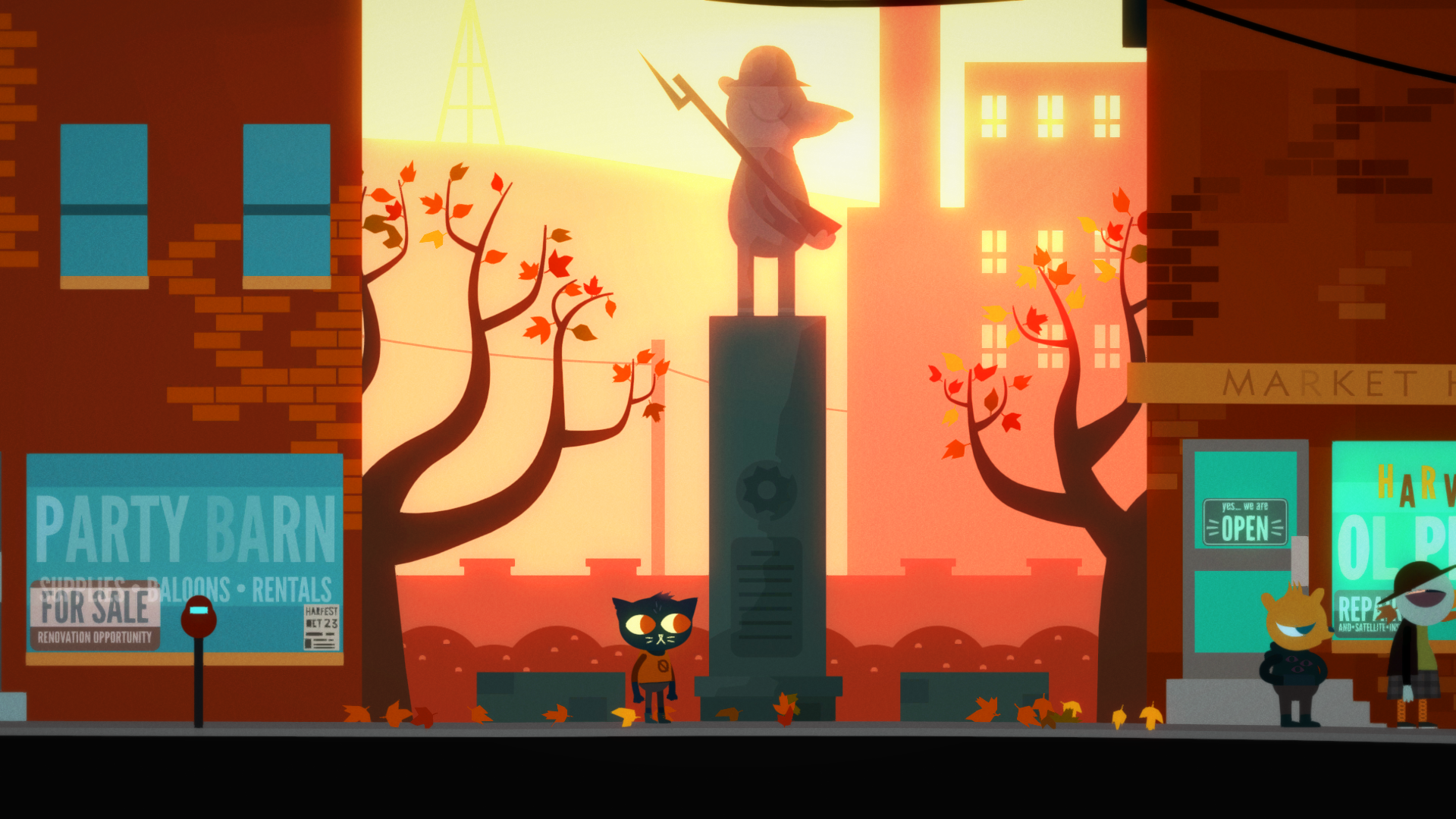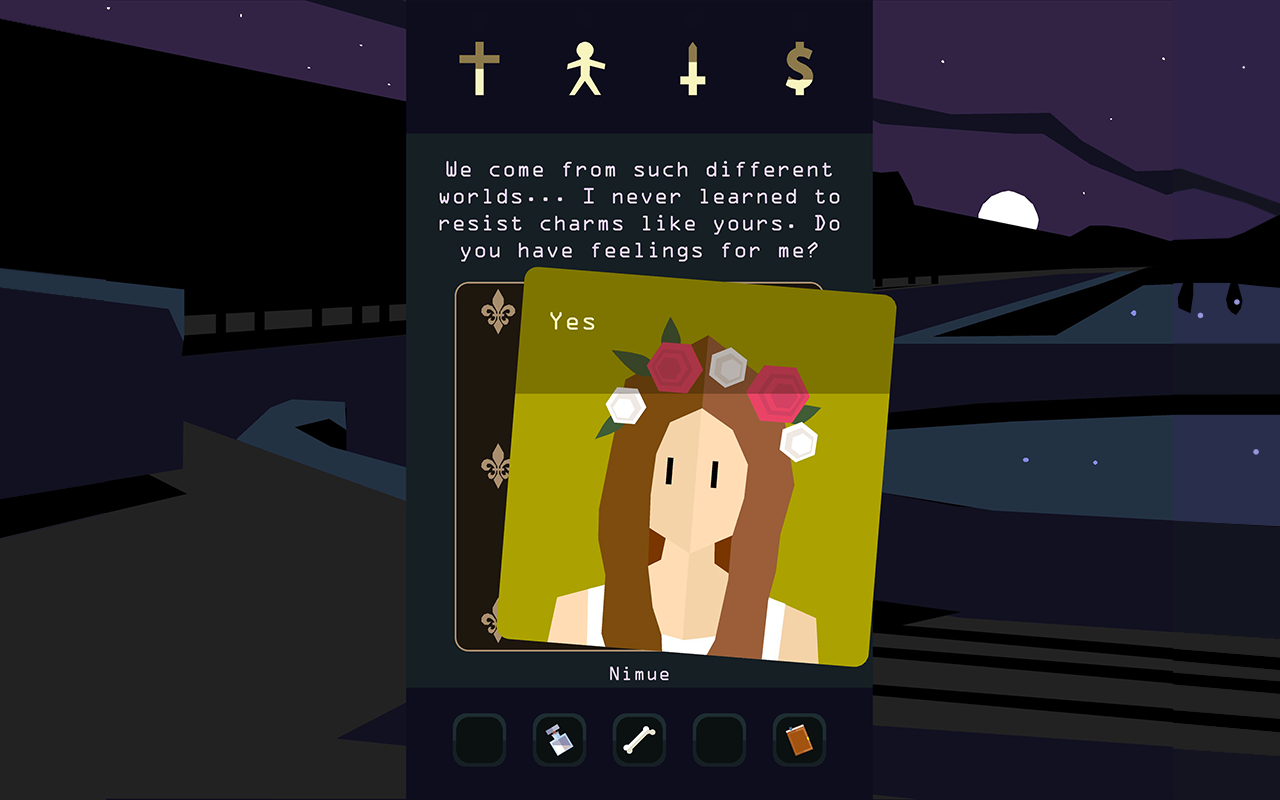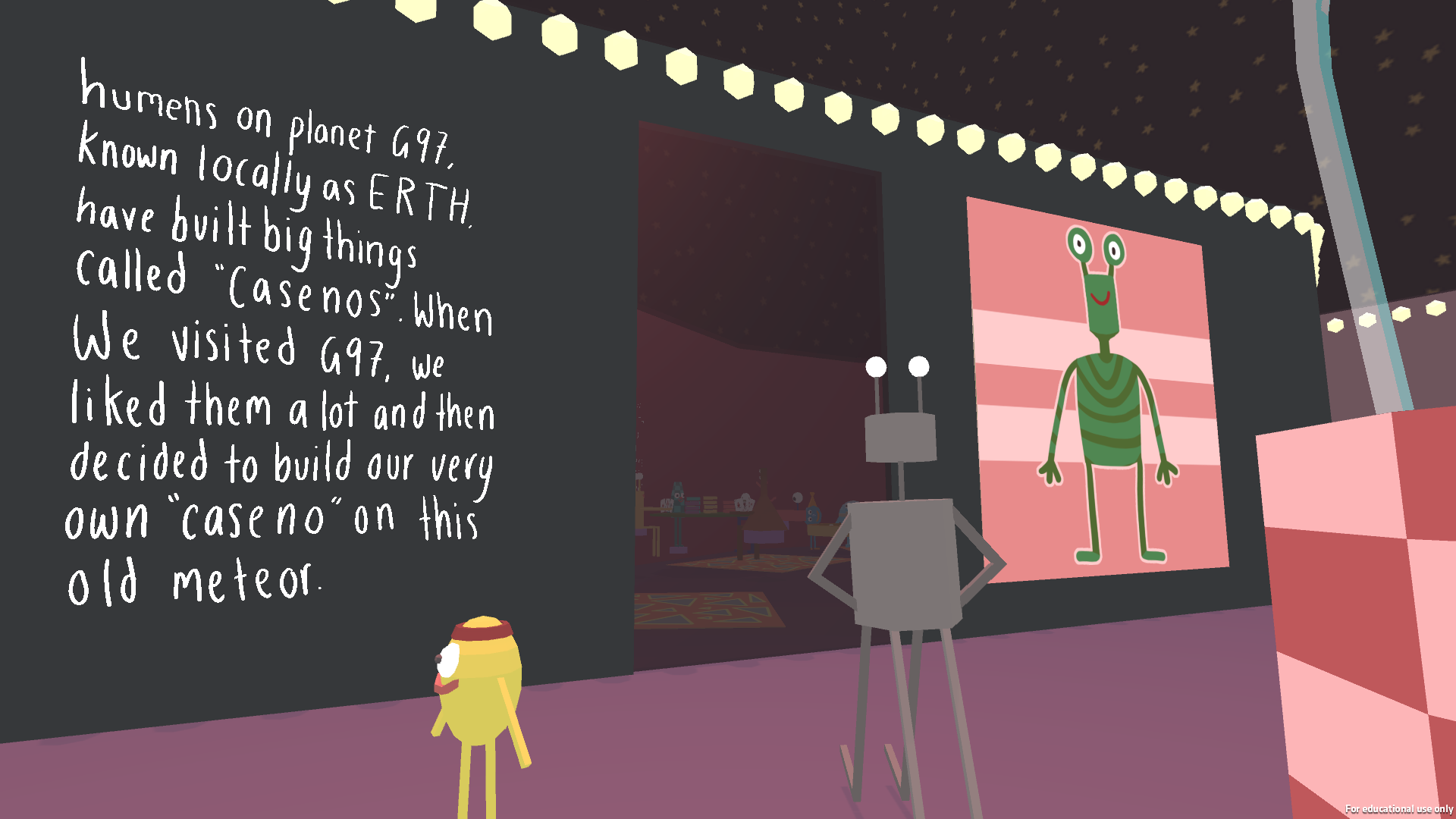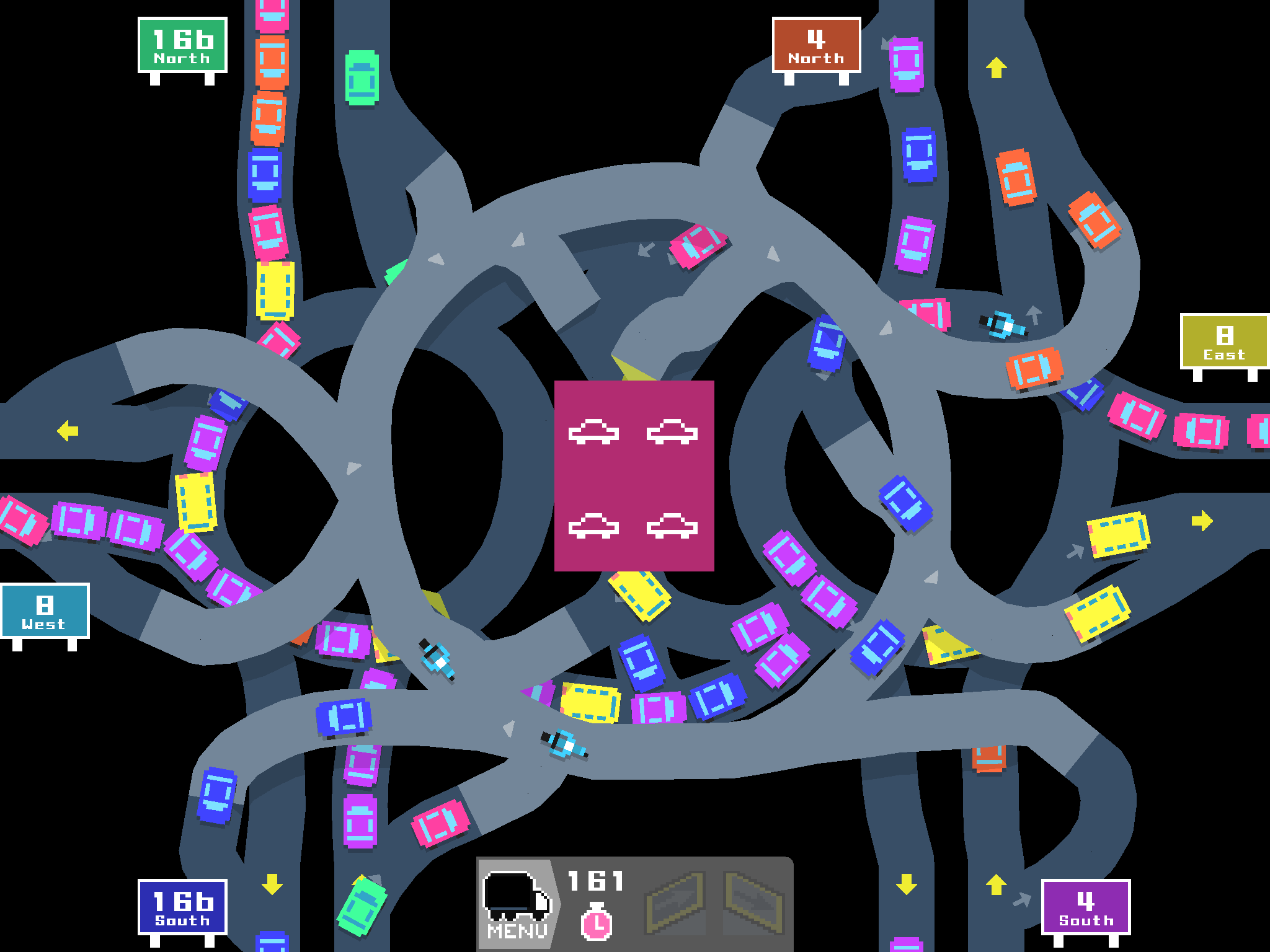I’ve been interested in the attention economy of videogames lately and in the wicked problem of the duration of play experiences. While AAA companies gamblify their business models and compete for the most repulsive and exploitative monetization schemes, indies generally stick to wholesome premium experiences (in Apple newspeak, the pay once and play forever genre). But premiumness is hard to sell to the vocal gamers proletarized by an endless economic crisis. There’s plenty of pressure on indie gamemakers to offer the hours of playtime that can justify a $5 to $20 price tag – the kind of market positioning that can potentially pay the bills. Play hours can be generated expensively with content, or for cheap with truckloads of text, sheer difficulty, or repetition. This best-of-the-year list is devoted to the idealists who organize the players’ time according to their expressive goals, and not to the perceived market demand. If games are machines for wasting time, they may as well waste it in an artful way. Hand picked with my usual emphasis on things that matter and imperfectly ordered from longest to shortest:
Oikospiel Book I
If I have to spend hours immersed in a fantasy world, I want it to be a challenging and delirious world like David Kanaga’s. Oikospiel Book I is described as a “dog opera in five acts”, in that you play the role of a strike-breaking German shepherd with luscious music driving the whole experience. The game is thematically rich and metatextual, it revolves around immaterial labor, play, and environmental crisis. The title itself demarcates the scope: oikos is the greek prefix for ecology and economy, spiel is German for play, and the Italian word opera is related to labor. The wordplay and the references are dense, but the game doesn’t feel cerebral or academic. Leaping through flow-of-consciousness texts and stock 3d assets, glitchy assemblages and arresting musical acts, you may miss many of the ideas and subplots detailed in the libretto, but ultimately it doesn’t matter. Oikospiel is a gesamtkunstwerk held together by digital duct-tape, and part of the thrill is wondering if it will hold together conceptually and materially or crash under the weight of its own ambition. The surprise is that there is no gravity grounding the structure, it’s a romantic game to feel through its game-feel, and a rhizome of abstractions to absorb subliminally.
Link
Bury Me My Love
Bury Me My Love is a game that cleverly uses real time and the smartphone device to tell an important story. You play the role of Majd, a man living in war-torn Syria, as your wife Nour attempts to escape to Europe. You keep in touch with her through a snapchat-like app, advising, entertaining, and supporting her throughout her difficult journey. European countries are in a “refugee crisis”, mass hysteria, numerous setbacks and unexpected immigration regulations force the couple to make serious decisions on the spot. A text message can change Nour’s route or convince her to hire an expensive smuggler.
Although the settings can be changed, the whole story is meant to unfold in roughly real time. You have a short conversation, you close your app, and then you wait for Nour to recharge her phone, or to get to the next stop of the journey. Hours later she would send you a text (as a push notification) and touch base with you. It’s a powerful way to create suspense and empathy.
The creators are an all-French team but they did a huge amount of research into the matter, interviewing refugees and examining their text messages. The result is a mash up of many different experiences, a heartbreaking oral history compiled in a captivating form.
Link
Night in the Woods

The circular time of NITW can be daunting at moments. Not much is going on in the depressed Rust Belt town of Possum Springs. Not much agency is granted to the player as they hang out with the bratty protagonist Mae Borowski and her friends stuck in dead end jobs. And yet, day after day, you grow attached to that row of houses and its inhabitants. You start to notice the subtle changes of weather, the tensions between the characters, the darkness lying deep inside Mae. NITW is deceptively cute and whimsical until the knives come out. It slowly unfolds as an elegy to a community hollowed by capitalism, a coming-of-age tale about the anguish of growing up in a messed up world.
Link
Universal Paperclips
Frank Lantz’s latest game is a complex “clicker” in which you play as an Artificial Intelligence manufacturing paperclips. Like all clicker games, its casts the player’s time as an implicit resource. You can theoretically click the mouse button a million times, or leave a browser tab open for days, but you’d rather set up an engine that does it for you in an increasingly efficient way and revel in the labor you “saved”.
Universal Paperclips is an adaptation of a thought experiment about singularity. If intelligence was conceived as the ability to optimize the solution of a problem, and an Artificial Super-Intelligence was tasked with the creation of paperclips, such entity might end up taking over the world and turn it into a paperclip-producing factory, possibly even transforming all the planet’s atoms into paperclips.
The parallel with capitalism, in its industrial, informational, and bitcoin-speculative varieties is hard to escape.
Stretching the parable just a bit, it can be argued that we are currently living through a singularity in which a distributed intelligence we can’t control (capitalism/financial markets) is subsuming the planet and human society under the logic of profit.
Frank Lantz has argued that games are the aesthetic form of instrumental reason and as such they can bridge the gap between rationality and emotion. Universal Paperclips is a perfect embodiment of this idea: a deep, engrossing, addicting, and ultimately beautiful system that allows the player to over-identify with an optimizing deity.
I have a more critical take on the subject (namely that we need to create emotional distance and inject paradoxical and unformalized elements into games to counter the cybernetic bias of computing machines) but I still regard Universal Paperclip as a major accomplishment, not just for its compelling mechanics, but its capacity to gradually morph its internal economy. While the end remains the same, the means expand and transform continuously. The gameplay gradually incorporates marketing, soft power and finance, and eventually goes through major paradigm shifts. It’s a remarkable dramatization of the different phases of capitalism, albeit without explicit mention of crisis, and a great proof of concept for those who strive to envision systemic change through games.
Link
Fidel Dungeon Rescue
At first I couldn’t believe that Daniel Benmergui, the creator of many poetic and artsy games, put his highly anticipated Storyteller on hold to work on a side project of a side project which spun off from a prototype satirizing dungeon crawler games. Somewhere along the way, Daniel discovered something extraordinary, and forged it into a little-big game about a dog rescuing his elderly owner.
Fidel is a roguelike; in anno domini 2017 the term typically refers to turn-based gameplay involving a mix of exploration, combat, and leveling within a modular, randomly generated world. The twist in this case is that the titular character can’t move on previously explored tiles, turning an RPG-derived genre into a puzzle. But instead of the rigidly constructed mazes of a title like the Witness, Fidel doesn’t have pre-defined solutions nor paths that allow one to collect all the collectables or kill all the killables. Each step is a compelling negotiation with a system imperfect by design. Fidel manages to be deep without being too complicated or punishing. Game sessions are fairly short, easily slipping in the crevices of a non-gamer life, but also long enough to prevent the one-more-try addiction cycle. Moreover, it’s extremely polished and full of surprises that provide a sense of progression and personality often missing from traditional roguelikes.
Link
Freeways
I have a soft spot for messy puzzles with multiple solutions, and Freeways raises the bar of both messiness and multiplicity. The latest game by Justin Smith (the genius behind Desert Golfing and Envirobear 2000) is a love-child between a traffic simulation and MS Paint. Freeways envisions a future in which self-driving cars rule the world but highway exchanges are apparently designed manually by shaky-handed engineers with no undo function. Your goal is to draw the connections between a series of roads in the most efficient way. Since the vehicles are automated, it doesn’t matter how byzantine your system of ramps becomes, as long as it produces smooth traffic flow. The best results are Lovecraftian horrors of cloverleaf interchanges, fractal roundabouts, biomorphic overpasses and assorted asphalt nightmares. It’s a wonderfully artisanal and yet post-human way to think about infrastructure. Just make sure to play it on an iPad or with a drawing tablet.
Link
Reigns: Her Majesty

Reigns was already one of the best releases from last year, but Leigh Alexander’s writing took the sequel to the next level. In Reigns: Her Majesty you play as a lineage of queens governing a kingdom in turmoil. The executive decisions are structured as a series of short encounters with advisors and subjects through a Tinder-like interface. Each binary choice affects four variables representing the church, the people, the military, and your finances. The goal is to guess the effects of each action based on the internal logic of the world, and maintain the balance between factions. Some encounters unlock new sections and advance various story arcs.
While the original Reigns often felt like a number balancing game, Her Majesty adds a new layer of satire to the pandering mechanics. Even in the most powerful position, the queen regnant has to navigate through societal expectations, outright sexism, and sneaky “nice guys” trying to undermine her. There are echoes of gamergate and shards of social commentary throughout, but the real treat is the intergenerational quest for the transformation of patriarchal power.
Link
Four Last Things

My main gripe with high-fantasy in pop culture is the adoption of elements from the European Middle Ages and the Renaissance in complete disregard for the religious experience and the peasant’s perspective. All across media we are so used to see castles without churches and warring kingdoms with no apparent mean of subsistence. One might say that in fantasy, the concrete power of magic replaces the ideological power of the clergy, and nobility-centered stories are in continuity with the Chivalric Romance tradition (the original fantasy genre). But the outcome is a proliferation of narratives of an imaginary past that gives us no useful tools to think about centuries of actual Western history.
This is why Four Last Things felt refreshing to me, despite the familiar visuals and gameplay. The game is a classic point-and-click adventure primarily made of paintings from the Flemish Renaissance. You play as an ordinary guy who has to commit the seven deadly sins due to a bureaucratic quirk. The premise allows for plenty of Monty Pythonesque humor, but there is also a remarkable commitment to the historical material. More than a gimmick or a cost-saving strategy, the use of public domain assets informs all puzzles and situations. The collages are beautifully crafted and while looking for clickable items you’ll find yourself wondering where the digital manipulation happened. You may even appreciate details you would not have noticed in a museum, in front of the actual work.
Link
A Mortician’s Tale

Death in videogames is so omnipresent and yet so rarely problematized. From the rote-killing of shooters to the learning-by-dying of most action games, dead bodies blink and disappear, dissolve in gory bits, lay around as ragdolls, quickly forgotten.
A Mortician’s Tale is an openly “death positive” game: it supports a progressive movement striving to break the culture of silence around death in Western society. Playing as a young mortician, you have to perform the tasks and the emotional labor of your trade. While mastering tastefully stylized procedures, you have to keep in touch with a dear friend from college, and face the acquisition of your mom-and-pop business by a cynical funerary services corporation.
The player’s agency in A Mortician’s Tale is so narrow that it may feel like a one-hour-long tutorial; but if you don’t mind a linear story told through the conventions of a management game, you might find yourself deeply touched.
Link
Everything is Going to Be Ok

Nathalie Lawhead is notorious for her hysterical apps and games exploding with glitches, hand drawn animations, and ’90s computing psychedelia. Everything is Going to Be Ok goes beyond style and sheer weirdness, channelling this unique language toward a more focused expressive goal. The project is a digital fanzine, a collection of short games and gamelike experiences with recurring characters and themes. The scenes explore communication breakdowns, social awkwardness, the elusive nature of real friendships, and the internet as a messed up remedy for all of this. Everything is Going to Be Ok is dark, intense, and funny like a Don Hertzfeldt movie, but also boldly innovative for its use of humor in an interactive medium.
Link
Topsoil

In a better world, Topsoil would be as popular as Candy Crush or 2048. In the current one, everything is topsy turvy and the bad guys always win. But that should not prevent us from enjoying minutes of bliss with this overlooked puzzle. Topsoil is a tight, abstract territory management game. You plant seeds and decide when to harvest a certain crop growing on a certain color. Each harvest cycles the terrain (a rare systemization of crop rotation in agriculture) so you have to hedge your bets and attempt to synchronize cycles to avoid the fragmentation of your land. It’s easier to play than to explain. Secretly install it on your puzzle-addicted relatives’ device.
Link
Alien Caseno

Aliens exist but what do they think of us? Are they appropriating our culture and getting everything wrong? Alien Caseno is a tiny world that will make u think big and make u laugh.
Link
and i made sure to hold your head sideways

It was New Year’s Eve and everybody drank too much. You piece together memories of that wild night, memories that appear like a deconstructed children’s book. This is a short, intimate, serene game about taking care of the people you love.
Link
Statues

Sometimes revolutions happen at a glacial pace. Nothing appears to change, or so they think.
Link
Tempres

Game. Game of. Game of the. Game of the year!
Link
Bonus
Here are some wonderful things you should play instead of Zelda, Mario or that first person shooter: faces are face-melting puzzles, object-oriented ontological puzzles, police abuse and VR are a perfect match, pushing the boundaries of interactive cat humor, a praying mantis anti-dating sim, 7 years of development for 30 minutes of gameplay, historically accurate gay hookups in a public bathroom except the penises are guns because of censorship, come for the islamic art inspired puzzles, stay for the sandbox mode, a game in which you have to pet the pup at the party, it’s a solitaire… it’s a puzzle… it’s a roguelike, a management game for our times, Porpentine forms a posse and goes serial, mononoke your way into a mysterious nature, what is it like to be a moth?





